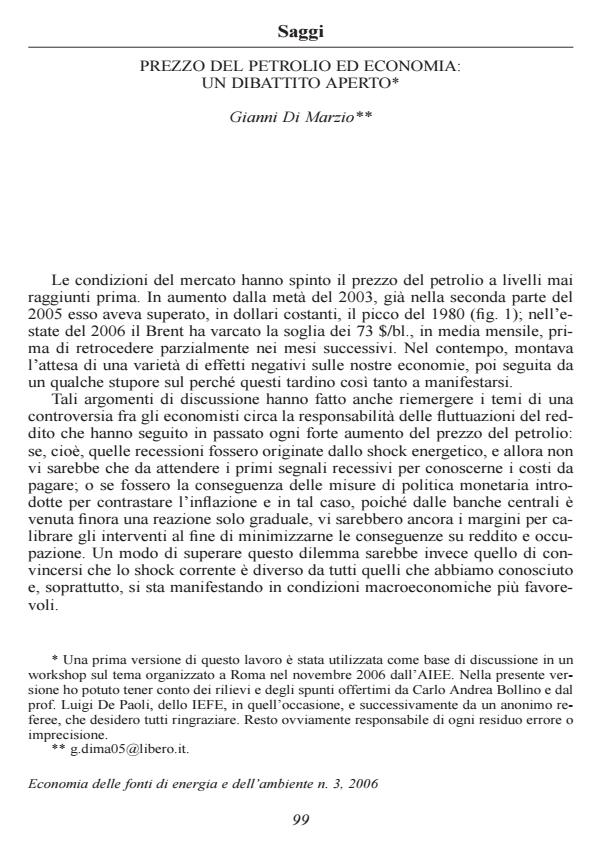Prezzo del petrolio ed economia: un dibattito aperto
Titolo Rivista ECONOMIA DELLE FONTI DI ENERGIA E DELL’AMBIENTE
Autori/Curatori Gianni Di Marzio
Anno di pubblicazione 2008 Fascicolo 2006/3 Lingua Italiano
Numero pagine 36 P. 99-134 Dimensione file 301 KB
DOI
Il DOI è il codice a barre della proprietà intellettuale: per saperne di più
clicca qui
Qui sotto puoi vedere in anteprima la prima pagina di questo articolo.
Se questo articolo ti interessa, lo puoi acquistare (e scaricare in formato pdf) seguendo le facili indicazioni per acquistare il download credit. Acquista Download Credits per scaricare questo Articolo in formato PDF

FrancoAngeli è membro della Publishers International Linking Association, Inc (PILA)associazione indipendente e non profit per facilitare (attraverso i servizi tecnologici implementati da CrossRef.org) l’accesso degli studiosi ai contenuti digitali nelle pubblicazioni professionali e scientifiche
Oil price shocks and economy: an open question, by Gianni Di Marzio During the 1970s and 1980s advanced oil importing economies faced the adverse effects of oil supply disruptions with abrupt energy price rise, followed by sensible business cycle inversions and stagflation. The negative effects of the sharp energy price increase were amplified by factors such the induced costly resources reallocation between labour and capital, and between sectors of activity; rising uncertainty discouraging investments, and income redistribution consequences on aggregate demand. After a shock the economic system generally adjusts in favour of less energy intensive industries; this leads pauses in production as part of the existing capital stock become obsolete, and causes resources underutilization. Since the 1970s a number of economists have been sceptical about why even large price shocks in a resource that accounts for less than 3-4 pct. of global GDP could cause losses of magnitude as those experienced in most advanced economies. They believe that monetary policy has played a role in generating the observed negative correlation between oil prices and economic activity, and question whether the post-oil-shock recessions were attributable to the oil price shocks themselves or to the monetary policy responding to these shocks. Empirical research largely shows a primary responsibility of large price shocks and major oil-supply disruptions on recessionary movements of GDP. Energy prices have risen sharply since 2003, driven by strengthening global demand; market fundamentals suggest that a considerable fraction of recent hikes will be permanent and current price levels remain credible. With limited spare capacity, the medium term oil supply-demand balance is expected to remain tight, and the price probably near current levels. Today’s high oil prices reflect the effects of sustained energy demand trends and, jointly, oil industry underinvestment during and after the low price era of the 1990s. The apparent moderate macroeconomic effects of the rise almost certainly reflects the strong global economic environment in which it occurs; the main factor mitigating adverse effects has been the sustained and autonomous expansion of the global economy. Large oil price fluctuations produce now smaller effects than in the previous decades; although oil price shocks have continued to occur, there have been no major episodes of stagflation since the 1970s. Estimates confirm smaller effects of the current price shock after taking into account the global decline in oil intensity of GDP and a better monetary policy management. Advanced consuming economies have become better adapted to deal with oil price increases and volatility; institutional characteristics of economic systems show simply less rigidities and regulations; the extent of inflation pass through from terms-of-trade shocks has declined in recent years as labour markets have become more flexible; energy-intensive manufacturing industries contribute less than before to real GDP formation. All these elements allow for faster adjustment processes. Since 2002 global macroeconomic conditions have been more favourable than in any previous period, with a primary role developed by monetary policy, whose moderate stance has been allowing for international real interest rates historically low, so sustaining global output growth and demand pressure on oil prices. But the experience subsequent the 1990s does not provide reasons for dismissing the risk that persistent oil price increases will pass through into core inflation, so pushing monetary conditions to change.;
Gianni Di Marzio, Prezzo del petrolio ed economia: un dibattito aperto in "ECONOMIA DELLE FONTI DI ENERGIA E DELL’AMBIENTE" 3/2006, pp 99-134, DOI: